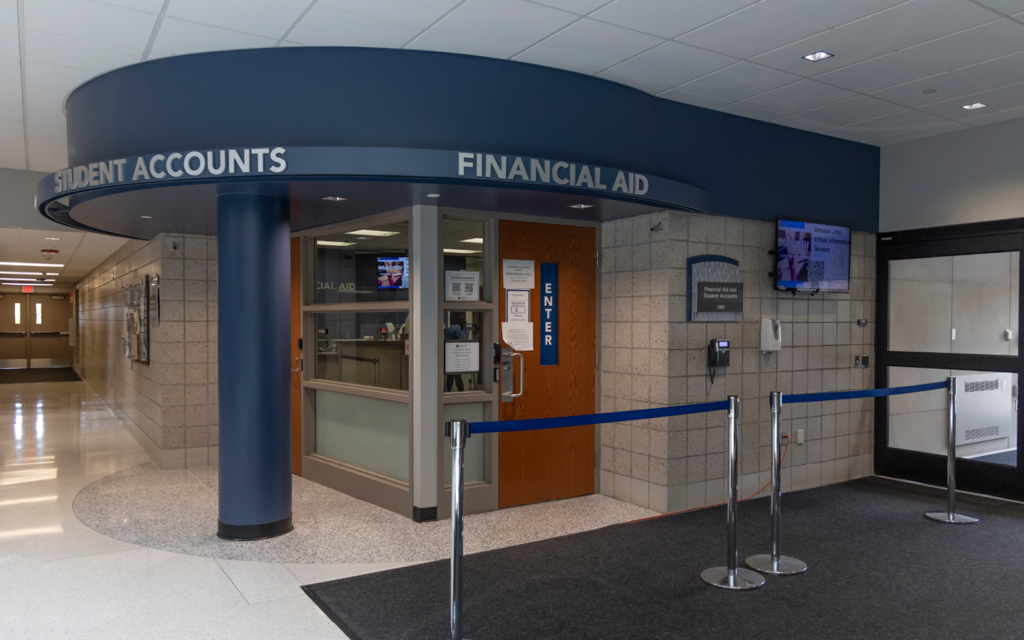These two important departments sometimes get confused
Learning, of course, is the goal of any college experience. Part of that education means familiarizing yourself with some unfamiliar terms. Don’t worry, we’ve got you covered.
As part of an occasional series, we’ll explain phrases, lingo or topics to add to your college vocabulary. We call it “Say What?” If there’s a topic you’d like to see covered, please send suggestions to [email protected].
Today we’ll learn about the differences between two departments at Schoolcraft College that are sometimes confused: Financial Aid and Student Accounts.

In a general sense, financial aid refers to resources a student might use to pay for higher education, such as grants, scholarships and loans.
Student Accounts, on the other hand, is responsible for all of the billing related to Schoolcraft College. This department does NOT handle financial aid.
With both Financial Aid and Student Accounts, it’s best to get as early of a jump as possible on your business to hopefully avoid headaches later on.
Let’s take a quick look at each department, starting with Financial Aid.
Things to know about Financial Aid
For just about any sort of financial aid, the starting point is the Free Application for Federal Student Aid, better known as FAFSA, which you complete online. For some, filling out the FAFSA is pretty straightforward. For others, it’s a long and involved process. You can save your work, so if you have to stop, that’s OK.
Basic information to have handy includes:
- Your social security number
- Your driver’s license number
- Federal tax return (Student/Parent when applicable)
- Anything else that shows reported income
- The school you’re attending or interested in attending
It’s best to file the FAFSA as early as possible. Again, as the name states, it is free to fill out – no fees whatsoever.
Getting back to student financial aid, there are five main types:
- Federal Grants: Requires a FAFSA application. Grants are need based and given without repayment requirements.
- Federal Work Study: Requires a FAFSA application. This program allows students to earn money to pay for their college education. These positions are not guaranteed.
- State Programs: State-sponsored programs such as Tuition Incentive Program, Michigan Competitive Scholarship (MCS), Michigan Education Trust (MET) and Michigan Education Savings Plan (MESP).
- Scholarships: Are given without repayment requirements but may have many factors involved in meeting requirements, often need and academic levels. There is a separate application required. A number of scholarships may require that a student has completed a FAFSA.
- Loans: Requires a FAFSA application. Funds are available to students. All loans must be repaid with interest. Repayment begins when you are no longer attending college at a part-time credit level or graduation.
It’s best to explore your options and possibilities with each source and use each to best advantage. Most students pay for college through a combination of financial aid. Schoolcraft College’s Financial Aid team can help answer questions.
Looking into scholarships
Schoolcraft College currently has over 300 scholarships for students. Non-traditional students and those from underserved populations are especially encouraged to explore what’s offered.
Keep in mind that these are just the start – many entities offer scholarships as well. As with working to find the right job or internship, networking skills can help you find scholarships, too. Some students may qualify for the Detroit Promise scholarship opportunity. There are also other scholarship avenues students can pursue like Scholarship America and FastWeb! that lists multiple scholarship opportunities any student can receive.
Learning about loans
In a general sense, loans are available from two sources: The federal government or lenders. The federal government distributes federal loans at a fixed interest rate. These rates are generally lower to those from a private lender.
A lender such as a bank or other institution offers two types of loans – secured or unsecured. A secured loan is backed by collateral, such as a house or other property or assets. Secured loans basically offer some security for the lender and generally have lower interest rates. Unsecured loans do not have this type of backing and generally have higher interest rates.
Depending on your financial situation, it may be advantageous to have a co-signer for your private loan. In fact, the lending institution may require it.
To learn more:
For more information about financial aid at Schoolcraft College, please visit the financial aid webpage at schoolcraft.edu/aid. You can also reach the department via email and phone at [email protected] or 734-462-4433.
Things to know about Student Accounts
Again, Student Accounts is a separate department from Financial Aid. Its role is to help students understand their billing and answer questions and review the steps needed to keep your account in good standing.
They also can help make sure any college savings plan funds you’re using are sent to your account and ensure any refunds are properly credited.
One avenue students are urged to consider is establishing a payment plan as soon as they register for classes. It’s interest-free and can help spread out what you need to pay over a longer period of time, giving you more flexibility and convenience.
As a reminder, all tuition and fees are due within three weekdays of registration.
If your class is to be paid for by your business or other third party, Student Accounts can help coordinate those payments as well.
Student Accounts also can provide any tax forms that might be needed and can assist international students with payments coming from outside the United States.
To learn more
For more information about, please visit the Student Accounts webpage. You also can reach the department by email at [email protected].

